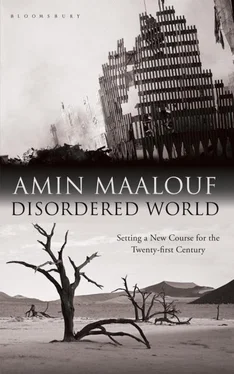Am I going to say that at the end of my investigation I can verify that this phenomenon is serious and that it constitutes a threat to human civilisation? That is indeed the deep conviction I came to; but — and I say this in all sincerity — my judgement in this matter does not count for very much. In matters of science, the opinion of a layperson such as me does not merit being taken into consideration. To use a term which keeps coming up in my analysis, I have no intellectual legitimacy in this field. However, as a man who cares about the well-being of those who are dear to him, as a responsible citizen, worried by the excesses of the human adventure, and as a writer who is attentive to the debates which animate his contemporaries, I cannot shrug and make do with the conclusion that only the future will tell us whether we have been too alarmist or too disbelieving, too pusillanimous, and that we will find out in thirty years who was right and who was wrong.
Waiting for the judgement of the future means running a terrible risk. If it is true that in thirty years the damage caused by climate change has become irreparable, and if it is true that planet earth will already have gone out of control, that it will function erratically and ultimately uncontrollably, it would be absurd, suicidal and even criminal to wait for the future’s verdict.
So what should we do? Act before we are certain that the threat is real? Act even if we were to discover in thirty years that the Cassandras were wrong? My answer — though I admit it is paradoxical — is yes, we must act, and even if we have remaining doubts, we must behave as if we do not.
This attitude may seem irrational. But for once I would own up to it without a hint of hesitation. Not based on my deep conviction, which, though informed, concerns no one but myself. Nor simply because an overwhelming majority of scientists are convinced of the reality of global warming, and that its causes are linked to human activity, and also that this change poses a deadly threat to the future of the planet and its inhabitants. This near-unanimous consensus cannot be disregarded and I of course take it into account, but it does not constitute the last word in my view. The majority is not always right, and scientists have been wrong before. However, I believe that we ought to heed them in matters of climate change and as a consequence we must act, even before we are certain they are right.
To clarify my position, I shall formulate a wager, inspired by the one devised in the past and in a quite different context by the incomparable Blaise Pascal. With, however, a difference of scale: the result of Pascal’s wager could only be checked in the afterlife, whereas it will be possible to check our wager here on earth relatively soon, since the vast majority of those who currently inhabit our planet will still be alive.
I shall therefore consider the two principal reactions to climate change — the inadequate and then the adequate one — and try to imagine the consequences each of them would entail.
The first hypothesis is that no major step change occurs. Some countries make efforts to limit their greenhouse gas emissions; others react more half-heartedly with no more than cosmetic measures, so as to avoid appearing to be bottom of the class. Still others do nothing at all, for fear of harming their economic activity or upsetting their consumption patterns, and therefore continue to pollute quite happily. As a result, the concentration of carbon dioxide in earth’s atmosphere keeps rising.
On this reckoning, where will the world be in thirty years? If we believe the majority of scientists, as well as the United Nations and all the international organisations which keep sounding the alarm, we will be on the brink of apocalypse, because we will have passed the point at which we can prevent our planet from running totally out of control. Without going into too much detail, I shall limit myself to signalling two pieces of evaluation data which strike me as particularly worrying.
The first is that the rise in the planet’s temperature, which is a consequence of the greenhouse effect, will cause the evaporation of water from the oceans, which in turn will increase the greenhouse effect. In other words, we could enter a vicious circle of warming which will no longer be dependent on anthropogenic greenhouse gas emissions, but will accelerate by itself and become virtually impossible to stop. When do we risk reaching this tipping point? Opinions vary, but some think that it could kick in as early as the first quarter of this century. What is certain is that the longer we take to react, the more painful and costly the efforts we shall have to make.
The second piece of data, which points in the same direction, is that dramatic climate events may happen very suddenly, much more so than is currently thought. By way of example, it is thought today that the last swing from a glacial to a temperate period, which took place around 11,500 years ago, happened not by a slow process over centuries or millennia, but suddenly, in no more than a decade. Moreover, numerous scientists who have been studying climate-related phenomena for decades have been constantly surprised by the rapidity of changes, which often go far beyond the forecasts of what was thought plausible. All of which means that we must not imagine that everything we are talking about will not have consequences before the end of this century or into the following ones. We really cannot tell, and it would be wise to start preparing immediately for the worst-case scenario.
In thirty years — I am sticking to this figure so as to remain within the framework of a period which is meaningful in terms of a human lifespan, and which allows my generation still to speak of ‘us’ — we may not have witnessed all the changes which loom on the horizon, but we will already have had some devastating examples. And more seriously, the whole of humanity will have to endure a state of emergency for decades and the imposition of heavy sacrifices which will be difficult to bear without even the assurance that we can still prevent our descent into the abyss.
What if the majority were wrong? What if the future vindicated the dissenting minority which rejects the cataclysmic forecasts, mocks their alarmism and questions any link between our gas emissions and global warming; and which sometimes does not even believe in the reality of global warming, reckoning rather that we are witnessing natural temperature cycles which oscillate down then up, then down again, for all sorts of reasons which depend much more on the sun’s activity than humans’?
Once again, I am not qualified to refute these arguments and I want to suppose here that they could turn out to be true. If that is the case, we could not but rejoice. Many people would have to eat their hats with whatever grace they can muster: scientists, political leaders, international officials and everyone who believed them and relayed their fears — including me, if I am still around.
And now for the second hypothesis: humanity takes action. Benefiting from the political changes in the US, we see a major step change. Draconian measures are taken to reduce significantly fossil fuel consumption and carbon concentrations in the atmosphere. The rate of global warming slows, sea levels do not rise and no major drama linked to climate change takes place.
At this prospect, I imagine a debate between two scientists thirty years from now. One belongs to the majority consensus and supports the view that it was thanks to this step change that humanity escaped a global catastrophe which would have threatened its survival. The other belongs to the dissenting minority and continues stubbornly to insist that the dangers were grossly exaggerated and even simply an illusion. It is unlikely there would be agreement between them. Since the ‘patient’ is still alive, how can it be conclusively shown that he was in mortal danger? The two doctors by his bedside could debate indefinitely.
Читать дальше












